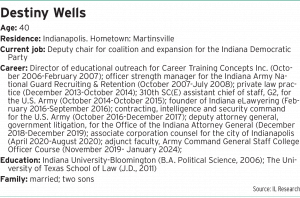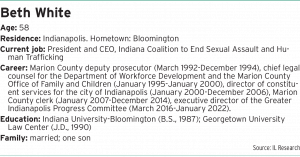Subscriber Benefit
As a subscriber you can listen to articles at work, in the car, or while you work out. Subscribe NowIndianapolis attorneys Destiny Wells and Beth White will battle it out at the Democratic state convention this summer as they seek to become the party’s nominee for Indiana attorney general.
But they have one common goal: defeating incumbent Republican Todd Rokita in the fall.
They say he is too focused on hot-button, culture-war issues and not focused enough on the job’s real role of protecting Hoosier consumers.
Rokita is generally unapologetic in his approach, casting himself as exactly what his campaign says a majority of Hoosier voters want: a fighter who protects constitutional liberties.
But his behavior has gotten him into some hot water. Last year he was publicly reprimanded by the Indiana Supreme Court for comments he made about Dr. Caitlin Bernard of Indianapolis after she spoke publicly about overseeing a medication abortion for a 10-year-old Ohio rape victim.
Fallout from comments Rokita made after the reprimand also has given rise to fears among some in his own party that he could face future discipline from the court, prompting a potential challenge to his re-election nomination at the Republican state convention on June 15.
Democrats see Rokita’s behavior toward Dr. Bernard and the fallout from other culture-war pursuits—including a controversial portal that invites parents to report examples of “indoctrination” in schools—as providing them with an opening to win their first statewide elected office since 2012.

Wells said the state’s attorney general should be rooted in law, not political ideology.
“Todd lives in his political ideology. He never talks about the law …” Wells said. “So it may sound just oversimplified, but really it is about being ethical and moral in adhering to the rules of professional responsibility.”
White said the office’s priorities should be protecting consumers, seniors and children. But she said Rokita is “focused on hot-button social issues and trying to restrict the rights and privileges of the people of Indiana, and I just can’t I can’t tolerate it anymore.”
Still, a Democratic victory against Rokita promises to be a tall order in a state where Republicans hold every statewide office, have supermajority control of both houses of the Indiana General Assembly and typically win by wide margins.
“Todd Rokita received the largest number of votes for any state candidate in Indiana history (in 2020) because Hoosiers wanted an Attorney General who puts their safety, values, and Constitutional liberties first,” Rokita’s campaign noted in written remarks. “That is exactly what they are receiving with Attorney General Rokita.”
Rokita’s campaign says he also has plenty of accomplishments to tout, including collecting a record $1 billion in legal settlements for Hoosier taxpayers in just three years and returning a record $81 million in unclaimed property to Hoosiers in just one year.
For Democrats, the tasks that lie ahead are persuading Hoosier voters that Rokita has strayed too far from just winning those types of settlements and determining whether Wells or White is the best candidate to make that case.
For the next few months, the two candidates will be making their pitch to Democratic delegates who will choose the party’s nominee for attorney general at the state convention on July 13.
A veteran preparing for battle
When Wells ran for statewide office in 2022, it was another race in which Democrats felt they had a chance to defeat what they considered to be a wounded Republican.
But in the end, she lost her bid for Indiana secretary of state to Republican Diego Morales by 14 percentage points despite a series of controversies that dogged Morales throughout his campaign.
 An Afghanistan veteran who earned the rank of lieutenant colonel in the U.S. Army Reserve, Wells views that election as setting her up for a bigger battle.
An Afghanistan veteran who earned the rank of lieutenant colonel in the U.S. Army Reserve, Wells views that election as setting her up for a bigger battle.
“I look at it as a race where we were prepping the battlefield. So, softening the ground, going out throughout the state, understanding the environment better,” Wells said.
She said her entire team came back for this election to support her. “I feel it’s very demonstrative of the belief that they have that we have a winning race,” she added.
Workers’ rights is one issue Wells would like the attorney general’s office to address more frequently, but she said her key issue will be restoring integrity to the office.
She worked as a deputy under former Attorney General Curtis Hill and bemoaned how office morale plummeted after he received a 30-day suspension of his law license over allegations that he drunkenly groped four women at a party.

“I didn’t think it could get any worse. And so now I’ve left the office and I see that Todd Rokita is leading the office,” she said.
Wells said that the difference between her and White is that she’s already been out traveling all across the state for the past several years attempting to motivate people. She said that they both have honed their craft as attorneys but need to be looking at the role from a leadership perspective.
“It is going to take a heavy hand to rebuild the office. Yeah, it’s going to take a fresh look, it’s going to take an attorney general who can drum up the energy where people want to make the sacrifice, to go in and get paid a state wage to do the work and feel good about their service, ” Wells said.
A fighter focused on experience
Like Wells, White also previously ran for Indiana secretary of state. She lost to Republican Connie Lawson in 2014 by nearly 18 percentage points. It was her only other bid for statewide office.
But she’s had significant success running for office in Democrat-dominated Marion County, where she won two terms as county clerk and oversaw numerous elections.
She also has served as a Marion County deputy prosecutor and as an attorney for the Indiana Department of Child Services. She is now CEO of the Indiana Coalition to End Sexual Assault and Human Trafficking.
“I’ve had a great career. It’s not over yet,” White said. “I feel like I am prepared to step into the attorney general (role) because I understand the issues. I understand what needs to happen in order to be an effective advocate for the people that I’m elected to serve.”
 She said she’s been traveling the state and making phone calls to talk with convention delegates and voters to hear about what they want in an attorney general and explain how her experience will fill those needs.
She said she’s been traveling the state and making phone calls to talk with convention delegates and voters to hear about what they want in an attorney general and explain how her experience will fill those needs.
“I’ve loved the opportunity to interact with people and hear what they want from their government and what they feel like they’re not getting because I think these are the critical issues that we need to focus on,” White said.
She said she would also bring her own ideas to the table and would have the attorney general’s office be more involved in working with law enforcement on human-trafficking cases.
“I believe I am ready to lead Day One. I have been in charge of big offices. I have done hard things. I have run elections in the largest jurisdiction in Indiana. I have been able to stand up and fight against the partisan environment,” White said.
“I was a criminal prosecutor, I stood up for victims. I am spending my time now professionally standing up for victims,” she added. “I want people to really look at what I’ve done and think about that as a good predictor of what I would do as attorney general.”
Rokita’s future
As White and Wells prepare for battle, Rokita could face his own challenge at the Republican state convention on June 15, especially if the Indiana Supreme Court decides to take further disciplinary action against him.
The court publicly reprimanded him last year for statements he made on a Fox News program in which he called Dr. Bernard an “abortion activist acting as a doctor—with a history of failing to report.”
Rokita’s statement was found to have violated a professional conduct rule because it “had no substantial purpose, in connection with Respondent’s legal representation of the State, other than to embarrass or burden the physician.”
But the controversy didn’t end there. The same day the discipline was handed down, Rokita released a statement saying, in part, “Having evidence and explanation for everything I said, I could have fought … but ending their campaign now will save a lot of taxpayer money and distraction, which is also very important to me. In order to resolve this, I was required to sign an affidavit without any modifications.”
That prompted the court to later take the unusual step of unsealing the conditional reprimand agreement with Rokita at the request of the state disciplinary commission. The disciplinary panel argued that publicly releasing the agreement was necessary to “restore public faith that lawyers cannot manipulate the discipline system to obtain a desired result and then counter with a public statement disavowing the acceptance of wrongdoing.”

That public step and other related misconduct complaints against Rokita have caused some to speculate that the court could take further action against the attorney general and prompted Madison County Prosecutor Rodney Cummings to consider running against Rokita at the convention.
“I’m really concerned and still am, that our attorney general may not be able to hold office depending on how the issues with the Supreme Court go,” Cummings said.
Rokita has blamed a “predetermined” media narrative and pressure from his political opponents for the recent developments.
“Ultimately, this is about my opponents pressuring the Disciplinary Commission and the courts to do what they can’t do at the ballot box,” he said in a written statement to the Indiana Capital Chronicle late last year. “I’m not going to be silenced from communicating what I know to be true about health care providers or entities who violate patient privacy, or any other issue important to voters and taxpayers.”•
Please enable JavaScript to view this content.


Todd Rokita. What an embarrassment.
Rokita’s only concern is winning the nomination. If he does that, his win in the primary election is guaranteed.
Rokita might be a fool but show me the down ballot Republican whose incompetence has cost them anything more than 3-4% in the vote totals. The Indiana Democratic Party simply doesn’t have the ability to win statewide elections.
Indiana is only one of six (6) States that permit straight ticket voting: Those states are Alabama, Indiana, Kentucky, Michigan, Oklahoma, South Carolina. Since 2006, twelve states have rescinded their straight ticket voting.
If you want to address a NUMBER of deficiencies in our electoral process, get rid of straight ticket voting. If it is too much effort to know the candidates, and to make the selections for down ballot candidates, then your straight ticket “vote” for down ballot candidates shouldn’t be a factor in determining who is elected . And if you REALLY want to stir things up, get rid of party affiliation designations on the ballots… people might actually have to be knowledgeable (at least to know the candidate they want to elect), rather than just mindlessly pick the party lever…
Interesting idea to get rid of party affiliations designations. I like it!
Definitely straight ticket voting should be abandoned.